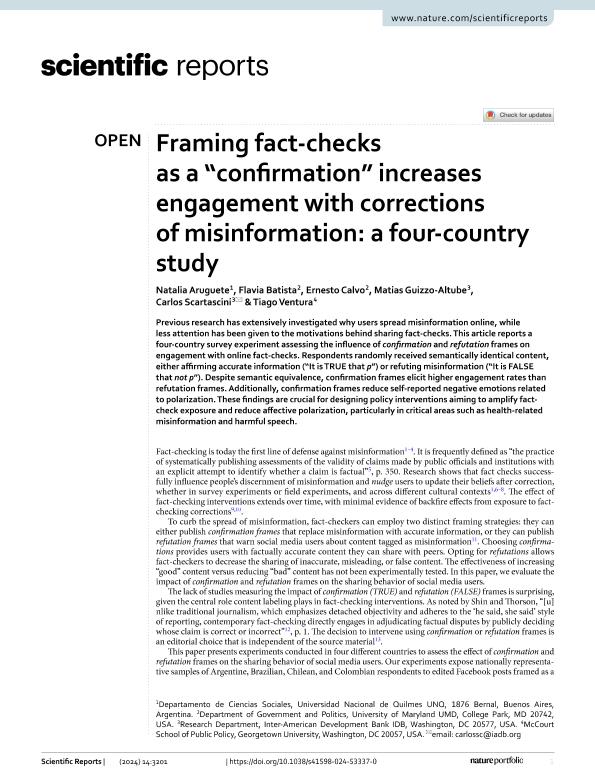Artículo
Framing fact-checks as a “confirmation” increases engagement with corrections of misinformation: A four-country study
Aruguete, Natalia ; Batista, Flavia; Calvo, Ernesto; Guizzo Altube, Matias; Scartascini, Carlos; Ventura, Tiago
; Batista, Flavia; Calvo, Ernesto; Guizzo Altube, Matias; Scartascini, Carlos; Ventura, Tiago
 ; Batista, Flavia; Calvo, Ernesto; Guizzo Altube, Matias; Scartascini, Carlos; Ventura, Tiago
; Batista, Flavia; Calvo, Ernesto; Guizzo Altube, Matias; Scartascini, Carlos; Ventura, Tiago
Fecha de publicación:
04/2024
Editorial:
Nature
Revista:
Scientific Reports
e-ISSN:
2045-2322
Idioma:
Inglés
Tipo de recurso:
Artículo publicado
Clasificación temática:
Resumen
Previous research has extensively investigated why users spread misinformation online, while less attention has been given to the motivations behind sharing fact-checks. This article reports a four-country survey experiment assessing the infuence of confrmation and refutation frames on engagement with online fact-checks. Respondents randomly received semantically identical content, either afrming accurate information (“It is TRUE that p”) or refuting misinformation (“It is FALSE that not p”). Despite semantic equivalence, confrmation frames elicit higher engagement rates than refutation frames. Additionally, confrmation frames reduce self-reported negative emotions related to polarization. These fndings are crucial for designing policy interventions aiming to amplify factcheck exposure and reduce afective polarization, particularly in critical areas such as health-related misinformation and harmful speech.
Palabras clave:
FRAMING
,
FACT CHECKING
,
PANDEMIA-VACUNAS
,
CONFIRMACION REFUTACION
Archivos asociados
Licencia
Identificadores
Colecciones
Articulos(SEDE CENTRAL)
Articulos de SEDE CENTRAL
Articulos de SEDE CENTRAL
Citación
Aruguete, Natalia; Batista, Flavia; Calvo, Ernesto; Guizzo Altube, Matias; Scartascini, Carlos; et al.; Framing fact-checks as a “confirmation” increases engagement with corrections of misinformation: A four-country study; Nature; Scientific Reports; 14; 1; 4-2024; 1-14
Compartir
Altmétricas



